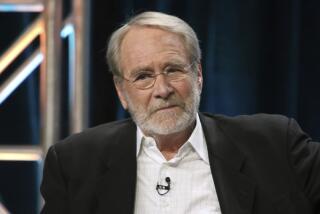Robert Mulligan dies at 83; directed ‘To Kill a Mockingbird’
Robert Mulligan, who was nominated for an Academy Award for directing the 1962 film classic “To Kill a Mockingbird,” died Saturday at his home in Lyme, Conn. He was 83.
Mulligan had heart disease, his nephew Robert Rosenthal said.
The director began working in live television in New York in the early 1950s and won an Emmy Award for the TV movie “The Moon and Sixpence” in 1960. His first film, “Fear Strikes Out,” was released in 1957 and told the story of mentally ill baseball player Jimmy Piersall, played by Anthony Perkins. Mulligan directed 19 more films, including “Summer of ‘42,” “The Other” and “Same Time, Next Year” before capping his career in 1991 with “Man in the Moon,” featuring actress Reese Witherspoon in her movie debut.
The highlight of Mulligan’s career was “To Kill a Mockingbird,” a courtroom drama adapted from Harper Lee’s Pulitzer Prize-winning novel and centered on Southern attorney Atticus Finch and his children, Scout and Jem. The film was nominated for eight Academy Awards, including best picture, and won three: best actor (Gregory Peck), best screenplay (Horton Foote) and art direction (Alexander Golitzen, Henry Bumstead and Oliver Emert). (“Lawrence of Arabia” was named best picture and David Lean best director for that film.)
“Mockingbird” was one of seven films Mulligan made in collaboration with producer Alan J. Pakula between 1957 and 1969, among them “Love With the Proper Stranger” (1963) starring Natalie Wood and Steve McQueen and “Up the Down Staircase” (1967) with Sandy Dennis.
As a director, Mulligan became known for his sensitive treatment of the emotional highs and lows experienced by children and adolescents when confronting traumatic circumstances. The Finch children see their father defending an innocent black man against his bigoted white accuser in “Mockingbird”; Hermie falls in love with a slightly older woman whose husband has been sent off to war in the nostalgic 1971 film “Summer of ‘42” (with Mulligan serving as the narrator); a young white boy played by Neil Patrick Harris and his Jamaican nanny (Whoopi Goldberg) find common ground amid family turmoil in “Clara’s Heart” (1988); and Witherspoon’s character discovers the pain of teenage heartbreak in “Man in the Moon.”
“Ordinarily they say that cliche, a ‘coming-of-age movie,’ and I reject that term,” Mulligan said in a 1991 interview with the Dallas Morning News. “I think it’s ‘coming to life.’ I felt, when I looked back on it, that I really didn’t know what life was about until I was somewhere in my teens, when you become aware that sooner or later you’re going to have to walk out the front door. Mother and Father are not going to be there, you’re not going to be protected. All those things become exciting and terrifying at the same time.”
Born in 1925 in New York City, Mulligan described his upbringing as “Bronx Irish.” He attended Fordham University and for a time studied to become a priest. He found his future in the early days of television and told his family in reminiscences that “nobody knew what they were doing. It was the ones with the cool heads who succeeded,” according to his nephew.
Mulligan directed segments for the ambitious live dramatic anthologies “Goodyear TV Playhouse” and “Philco TV Playhouse” on NBC, and the CBS programs “Suspense,” “DuPont Show of the Month,” “Studio One” and “Playhouse 90.” By 1959 he was being called “one of television’s wonder-boy directors” by Times critic Philip K. Scheuer.
Mulligan is survived by his wife of 37 years, Sandy; three children from a previous marriage, Kevin, Beth and Christopher; two grandchildren; and a brother, James.
His family suggests donations in his name to the Alan Rosenthal Research Fund, care of Jennifer Jacobson, Memorial Sloan-Kettering Cancer Center, 633 Third Ave., 28th Floor, New York, NY 10017.
More to Read
Start your day right
Sign up for Essential California for the L.A. Times biggest news, features and recommendations in your inbox six days a week.
You may occasionally receive promotional content from the Los Angeles Times.






